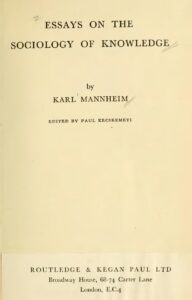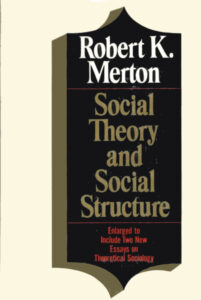Summary
The present volume contains six essays written by Karl Mannheim during the early part of his academic career in Germany. These papers have not been available in English thus far; they have remained scattered in various German publications. Their publication in this collection of Mannheim’s writings serves the purpose of illuminating the genesis and formation of one of his most important contributions to sociology, the Sociology of Knowledge.
For reasons of space, two essays of the same period, dealing with similar topics, will be included in a second volume of essays, otherwise devoted to writings published after Mannheim’s emigration from Germany in 1933. I have attempted to give a brief survey of the intellectual and political background of these writings, and of the stages through which Mannheim’s ideas concerning the sociology of knowledge developed.
Mannheim’s sociology of knowledge was often misunderstood as a variant of skepticism and illusionism. I shall try to show that his purpose was not to demonstrate the inescapability of relativism and skepticism, but rather the thesis that, in spite of the inescapability of certain relativist conclusions, genuine knowledge of historical and social phenomena was possible.
According to him, participation in the social process, which renders one’s perspective partial and biased, also enables one to discover truths of deep human import. In Mannheim’s approach, the productivity of social participation as a source of knowledge plays a more important role than the limitations that participation in the social process places upon knowledge. The reader will see, once the author’s intention has become clear, the universal and vital importance of the subject treated and of the author’s approach.
Contents
- INTRODUCTION
- Preparatory remarks
- Influences
- The development of the sociology of knowledge
- Critique of Mannheim's sociology of knowledge
- ON THE INTERPRETATION OF 'WELTANSCHAUUNG'
- The problem outlined,
- The struggle for a synthesis
- Rationalism v. Irrationalism
- 'Weltanschauung': its mode of presentation. The three kinds of meaning
- The pretheoretical structure of cultural products
- How can the global outlook be treated scientifically?
- HISTORICISM
- Static and dynamic thought
- The starting points of a theory of historicism (Troeltsch)
- Forms of historical movement
- Historicism and sociology
- Dynamic standards in thought and practice
- THE PROBLEM OF A SOCIOLOGY OF KNOWLEDGE
- The problem constellation
- Theoretical positions
- Sociology of knowledge from the standpoint of modern phenomenology (Max Scheler)
- Sociology of knowledge from the dynamic standpoint
- COMPETITION AS A CULTURAL PHENOMENON
- VI. ON THE NATURE OF ECONOMIC AMBITION AND ITS SIGNIFICANCE FOR THE SOCIAL EDUCATION OF MAN
- The social education of man
- What is 'success'?
- Objective and subjective success
- Unstable and relatively stable forms of subjective success
- The social structure and chances of success
- Success in a career
- Social sectors subject to and devoid of conflict
- Striving for success in general
- The striving for economic success
- Historical flexibility of economic ambition
- Types of ambition; types of personality; types of culture
- Flexibility of ambition according to social differentiation
- THE PROBLEM OF GENERATIONS
- How the problem stands at the moment
- The sociological problem of Generations
Extract
The essay on Sociology of Knowledge (1925), Mannheim's first outline of the theory which is presented in full detail in Ideology and Utopia, is a discussion of Max Scheler's Problem of a Sociology of Knowledge (published as the introduction to a collection of essays by various authors on this topic).1
As mentioned in the previous section, Scheler was a leading member of the phenomenological school and the author of a radically anti-relativist theory of values. That he became the first proponent of a sociological theory of knowledge is something of a freak of German intellectual history in the 'twenties. Mannheim himself saw in this a confirmation of his theory of Weltanschauung: if an idea becomes part and parcel of the global outlook of an epoch, then friends and foes, conservatives and progressives, relativists and absolutists will be bound to make use of it. I do not think that it was as simple as that; Scheler hit upon the idea of a sociology of knowledge as part of a vast strategic conception in his campaign against positivism.
What Scheler wanted to achieve by a sociological analysis of the various types of knowledge was the annihilation of Comte's famous theory of the 'three stages': human knowledge passes from a 'theological' through a 'metaphysical' to a final 'positive' stage, that of science. Science is the last word; after its advent, the earlier 'stages' are left behind, antiquated, dead. Scheler, a passionate thinker if ever there was one, hated this doctrine with every fibre of his being; how could it be destroyed? Essentially, by showing that 'science' was not the paradigm, the only adequate form of knowledge.
The present ascendancy of natural science was by no means proof that science was a superior form of knowledge, more valid than religion or metaphysics. It was merely the consequence of certain sociological facts. For indeed, it depended on sociological factors, on the prevailing organization of society, which type of knowledge would be cultivated. And a 'sociology of knowledge' was needed to find out which type of thinking would be practiced by men at this or that time. The 'mind' as such was powerless to determine this (p. 9).
Autor
Karl Mannheim (1893–1947) was a German sociologist, best known for his work on the sociology of knowledge. Born in Hungary, he studied philosophy and sociology, later becoming a prominent figure in the intellectual circles of Europe. Mannheim's most influential contribution was his theory of the "sociology of knowledge," which explores the relationship between human thought and the social context in which it arises. He argued that knowledge is shaped by social conditions and that different social groups perceive reality differently. Mannheim's work also engaged with issues of ideology, political thought, and social change, particularly through his analysis of the role of intellectuals in society.
Fleeing Nazi persecution, he moved to England, where he continued to develop his ideas. His major works include Ideology and Utopia (1929) and Freedom, Power, and Democratic Planning. (1950). Mannheim is regarded as a key figure in 20th-century sociology.
Book Details




